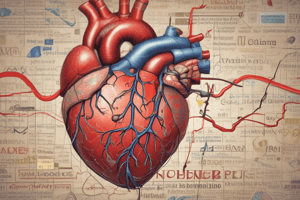Podcast
Questions and Answers
Stable Angina is characterized by chest pain during rest due to a reduction in blood supply to the myocardium.
Stable Angina is characterized by chest pain during rest due to a reduction in blood supply to the myocardium.
False (B)
Coronary Artery Disease can lead to Ischaemia, which is a reduction in blood flow.
Coronary Artery Disease can lead to Ischaemia, which is a reduction in blood flow.
True (A)
Heart Failure can only be classified as right-sided.
Heart Failure can only be classified as right-sided.
False (B)
Acute Coronary Syndrome includes conditions such as Unstable angina and ST-segment-elevation myocardial infarction (STEMI).
Acute Coronary Syndrome includes conditions such as Unstable angina and ST-segment-elevation myocardial infarction (STEMI).
The primary risk factor for Coronary Artery Disease among genders is that males are less susceptible than females until menopause.
The primary risk factor for Coronary Artery Disease among genders is that males are less susceptible than females until menopause.
Cardiac muscle can regenerate after permanent damage occurs.
Cardiac muscle can regenerate after permanent damage occurs.
Shortness of breath is an atypical presentation that can occur in a heart attack patient.
Shortness of breath is an atypical presentation that can occur in a heart attack patient.
Marked sweating is not commonly associated with Acute Coronary Syndrome.
Marked sweating is not commonly associated with Acute Coronary Syndrome.
Younger patients experiencing a myocardial infarction typically present with chest pain.
Younger patients experiencing a myocardial infarction typically present with chest pain.
Sickle cell disease is characterized by an issue with the haemoglobin in red blood cells.
Sickle cell disease is characterized by an issue with the haemoglobin in red blood cells.
Flashcards are hidden until you start studying
Study Notes
Cardiovascular Conditions Overview
- Main conditions include Coronary Artery Disease, Acute Coronary Syndromes, Stable Angina, Heart Failure, and Sickle Cell disease.
- Focus on signs, symptoms, and management of cardiovascular disorders.
Risk Factors for Coronary Artery Disease
- Heredity: Family history increases susceptibility.
- Obesity: Higher risk linked to excess body weight.
- Gender: Males at greater risk until women’s menopause, after which risk for females increases.
- Diet: High intake of refined carbohydrates, saturated fats, and cholesterol contribute to risk.
- Age: Risk increases with advancing age.
- Smoking: Major modifiable risk factor.
- Diabetes Mellitus: Elevates risk significantly.
- Emotional Stress: Can exacerbate conditions.
- Hypertension: Elevated blood pressure is detrimental.
- Sedentary Lifestyle: Physical inactivity raises risk.
- Cholesterol Levels: High LDL (bad cholesterol) contributes to disease.
- Alcohol Consumption: Excessive intake is harmful.
Atherosclerosis
- Accumulation of cholesterol in the tunica media leads to plaque formation.
- White blood cells encase cholesterol, creating a fibrous cap that narrows arteries.
- Can result in ischaemia (reduced blood flow) or infarction (complete blockage).
Stable Angina (Angina Pectoris)
- Characterized by ischaemic chest pain due to decreased blood supply to the myocardium.
- Pain occurs during exertion or stress, not at rest.
- Symptoms include chest discomfort, radiating pain to arms, neck, or jaw, and can be accompanied by belching.
Management of Stable Angina
- Patient Care: Keep the patient at rest to decrease heart workload.
- Pain Relief: Administer analgesics, if needed.
- Monitoring: Perform ECG for assessment.
Heart Failure
- Defined as an inability of the heart to pump sufficient oxygenated blood to meet the body's needs.
- Can manifest as right-sided, left-sided, or congestive heart failure.
- Cardiac output calculated as Stroke Volume x Heart Rate, influenced by preload, contractility, and afterload.
Key Terms in Heart Failure
- Preload: Blood volume in the heart at diastole end.
- Contractility: Strength of heart muscle contraction.
- Afterload: Pressure needed to eject blood from the left ventricle.
Signs and Symptoms of Heart Failure
- Common indicators include fatigue, dyspnoea (shortness of breath), and congestion.
- Patients may experience orthopnea (breathlessness when lying down).
Management of Heart Failure
- Ensure patient rest and full set of observations.
- Administer oxygen as required to maintain oxygen saturation above 94%.
- Perform ECG to evaluate heart function.
Acute Coronary Syndrome (ACS)
- Encompasses unstable angina, NSTEMI, and STEMI, resulting from significant coronary artery blockage leading to tissue ischaemia and possible infarction.
Common Symptoms of ACS
- Chest pain described as heavy, squeezing, or crushing; radiating pain to arms, jaw, or neck.
- Accompanied by nausea, vomiting, sweating, shortness of breath, pallor, and feelings of impending doom.
Management of ACS
- Swift 12-lead ECG and correction of life-threatening ABC problems.
- Administer medications per local guidelines and provide oxygen if necessary.
- Ensure rapid transport to an appropriate medical facility.
Sickle Cell Disease
- A genetic disorder affecting hemoglobin, causing red blood cells to become misshapen ("sickle" shaped) and obstruct blood flow, resulting in ischaemia.
- Sickle cells have a significantly reduced lifespan, leading to chronic anemia.
Types of Sickle Cell Conditions
- Sickle Cell Trait: One gene present, typically asymptomatic.
- Sickle Cell Disease: Both genes present, leading to severe symptoms and complications.
- Sickle Cell Crisis: Occurs when sickled cells block blood vessels, causing pain and ischaemia.
Signs and Symptoms of Sickle Cell Crisis
- Severe joint pain, difficulty breathing, possible jaundice, fever, and dehydration.
- Tactical signs include hypotension, tachycardia, and altered level of consciousness.
Assessment & Management of Sickle Cell Crisis
- Perform ABCD assessment and check for individual care plans specific to the patient.
Studying That Suits You
Use AI to generate personalized quizzes and flashcards to suit your learning preferences.




